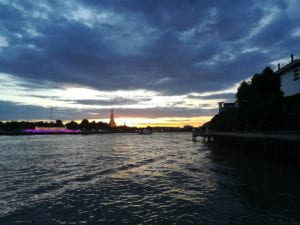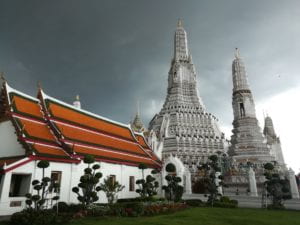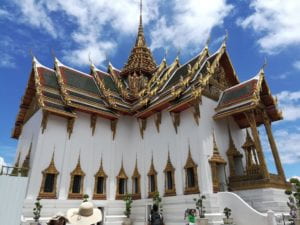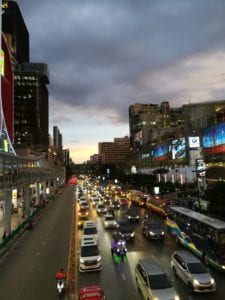BANGKOK
Anmei
Bangkok was, in some ways, nothing like I expected. Maybe I’d gotten used to the uneven pavements, screaming motorbikes, and comically persistent street vendors of Ho Chi Minh City (all of which, I came to regard endearingly, by the way) but Bangkok felt quieter, a little more polished. The city is perhaps best known for its unbelievable Buddhist temples (Wats) and grand palace by the river, which we spent a day exploring. Sometimes, when you come across a sight unique enough, you know that you will never encounter something like it ever again–this was one of those times. The architecture of every massive temple was elegantly intricate, and I especially loved studying the walls on the outsides of the temples: often with a white base color, they were filled with colorful flower designs and adorned with small, chipped porcelain plates and bowls (from China, according to a tour guide I overheard). I was surprised by how prevalent Buddhism is in Bangkok. Nicole and I came across numerous billboard signs proclaiming “Buddha Is Not For Tattoo or Decoration, Respect Buddha”, and it was a common sight to see monks taking the ferry (which we nicknamed the “water MRT” because locals used it as public transport to get to locations along the river).
The first ethnically Chinese individual we conducted an interview with in Bangkok was Ni, our friend Evan’s cousin. Ni, a third generation Chinese immigrant, seemed very integrated into Thai society but had once struggled with her ethnic/national identity until a professor peaked her interest in studying her family history and cultural roots. Back in Manila, one of our interviewees told us that the Chinese are very well adapted to Filipino society–but not as much as the Chinese in Thailand, who were probably the most well adapted Chinese overseas group in Southeast Asia. From what Ni–and our other interviewee later on–told us, that rang true. The Chinese are the largest ethnicity group in Bangkok, making up roughly 50%-70% of the population. They have good representation in the Thai government and high economic standing overall, and several Thai kings in the past possessed some Chinese heritage. Ni told us that she had never faced any discrimination because of her Chinese ethnicity and that she had never really seen any discrimination either–the only example she could think of was Thai locals’ negative opinion towards Chinese tourists. Ni’s theory for why there wasn’t any discrimination against the Chinese in Bangkok was that there is really no “pure” Thai: throughout history, the territory of Thailand had been given to other countries, bringing in a variety of migrants to settle and mix. Therefore, no one can really claim to be “pure-blooded” Thai and discriminate against “non-pure” Thai people.
Nicole and I were aware that, out of all the countries we were visiting on the Travel Fellowship, Thailand was the only one that had never been colonized. From our research on Indonesia, the Philippines, and Vietnam, we saw a pattern in that the colonizer country in each of these places seemed to favor one local ethnicity group–which brought that group social superiority over the other groups. That, of course, intensified antagonism amongst the residents of the country when the colonizers left. Because Thailand has never experienced this dynamic, perhaps that is part of the explanation for why the ethnically Chinese have integrated so well into Thai society.
In this way, our conversations with Ni and Nicha (our other interviewee) seemed very different from our conversations with Chinese individuals in the previous Southeast Asian countries we had visited. Many of our prepped questions didn’t apply to them because they identified so strongly with Thai culture and society. But through delving into their individual stories with spontaneous questions, it was clear that having some connection back to one’s roots and being aware of one’s heritage is still very important. Being conscious of who you are, specifically your ethnic or cultural background, allows you to position yourself in society and realize who you are in relation to others. As one interviewee put it, “it’s important to know your Chinese roots because you will never be local”. In a greater context, to me this means that knowing how you are different from others gives you perspective. What social advantages or disadvantages might you face that are different from what those around you face? How does belonging to a certain group change your experiences, mobility, and power?
So the age old question of “finding your identity” or “dealing with an identity crisis” is more than a cliche that coming-of-age movies use. While “identity” may sound cheesy and impossibly broad, this Travel Fellowship has certainly made me believe that at least trying to learn more about your identity is incredibly rewarding. It’s funny–this realization is a sharp contrast to my first blog post, in which I questioned if researching identity is even necessary. But I’ll elaborate on this and how an identity search was personally rewarding in my final post.




